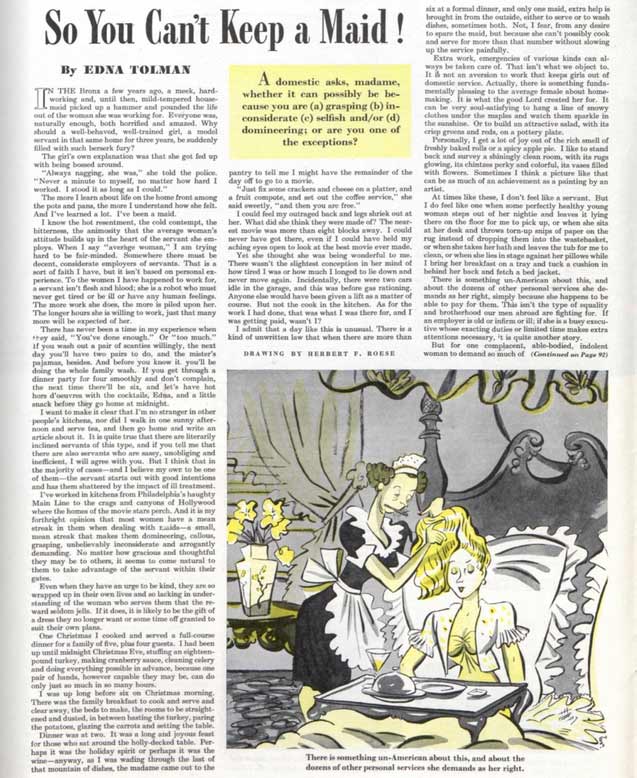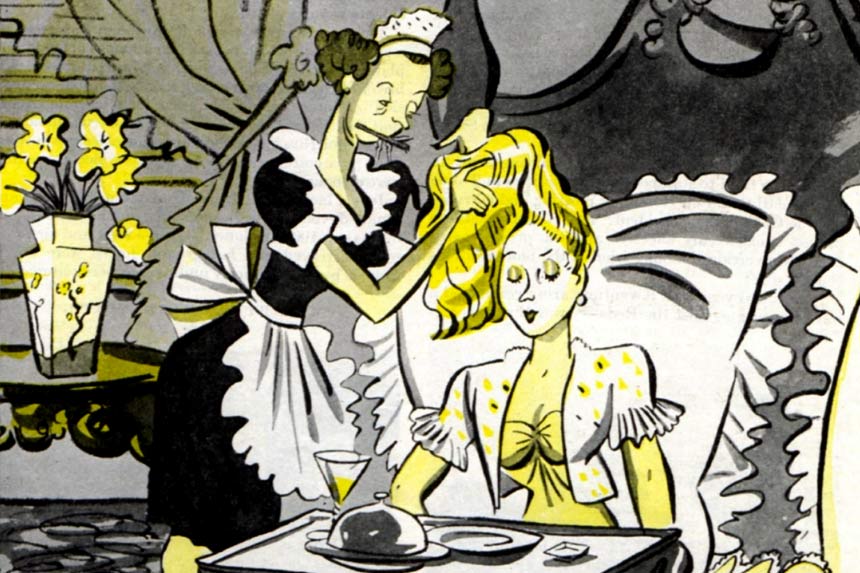In the 1940s, when house servants were three times more common in American households than they are today, many homeowners complained, “You can’t get decent help these days.” Here, a former maid tells the other side of the story.
I’ve worked in kitchens from Philadelphia’s haughty Main Line to the crags and canyons of Hollywood, where the homes of the movie stars perch. And it is my forthright opinion that most women have a mean streak in them when dealing with maids.
I don’t feel like a servant. But I do feel like one when some perfectly healthy young woman steps out of her nightie and leaves it lying there on the floor for me to pick up, or when she sits at her desk and throws torn-up snips of paper on the rug instead of dropping them into the wastebasket, or when she lies in state against her pillows while I bring her breakfast on a tray and tuck a cushion in behind her back and fetch a bed jacket.
There is something un-American about this, and about the dozens of other personal services she demands as her right, simply because she happens to be able to pay for them. This isn’t the type of equality and brotherhood our men abroad are fighting for.
—“So You Can’t Keep a Maid!” by Edna Tolman, October 9, 1943

This article appears in the September/October 2018 issue of The Saturday Evening Post. Subscribe to the magazine for more art, inspiring stories, fiction, humor, and features from our archives.
Become a Saturday Evening Post member and enjoy unlimited access. Subscribe now




Comments
I read Edna Tollman’s entire 1943 article online and was really disgusted with the downright intentional cruelty in which these women were treated by their very wealthy employers. I was tempted to say slave owners, for I’m sure there were plenty of parallells, despite the differences.
On top of the ridiculous over work thrust upon these maids/domestic help, the female home ‘owner’ kept sticking the knife of degradation deeper and deeper, setting those ugly examples to her children (particularly daughters) to do the same, which they did.
Reading this, I wished I (Samantha Steven’s style) could have zapped these nasty, spoiled women onto the front lines with the men fighting World War II, or some ugly, nasty time in a women’s prison! There were plenty of positions open for women too, in factories doing crucial work for the war effort I would have zapped them into, but first things first.
Some prison time does seem the best first dose for these evil women. Why should the wonderful, hard working, proud to-be-an American factory women be subjected to these women? Give them a couple of weeks in the women’s prison and let them BEG to be put into the factories instead, with grueling long shifts on their feet.
This article shows one aspect of women’s inhumanity toward other women, which has been either overlooked or intentionally “forgotten” in current times. I put comments in Ben Railton’s Oct. 9th feature on this. There’s plenty of backstabbing, undermining and harassment going on within the male and female genders, among white people with each other, blacks with each other, etc. It can often take subtle, non-obvious forms too.
I saw a story on ’20/20′ some years ago about a former female head of HR at a company who was not married, did not have children, but kept baby pictures out on her desk of her nieces and nephews intentionally as bait to ‘trap’ a female interviewee into revealing if she had children or not since they couldn’t “ask” otherwise. On occasion, if that didn’t reveal an answer, she’d walk them to their cars with some friendly “chit chat” all the while to see if there was an infant seat inside, or any other tell-tale signs she was a mother with young children.
If she determined the lady was a mom, she wouldn’t get a call back even if she was qualified otherwise. The reasoning was if she was a mom, she’d be calling in sick a lot due to her children or herself. It’s not right or fair, but this does go on. I’m glad in the case of domestic help nowadays it’s usually a maid that comes by for an hour or so (say) twice a month, for generally lighter work that the lady of the house really appreciates; working outside the home herself!